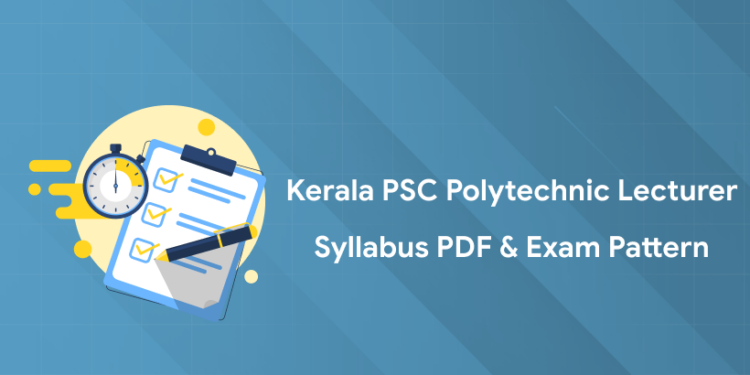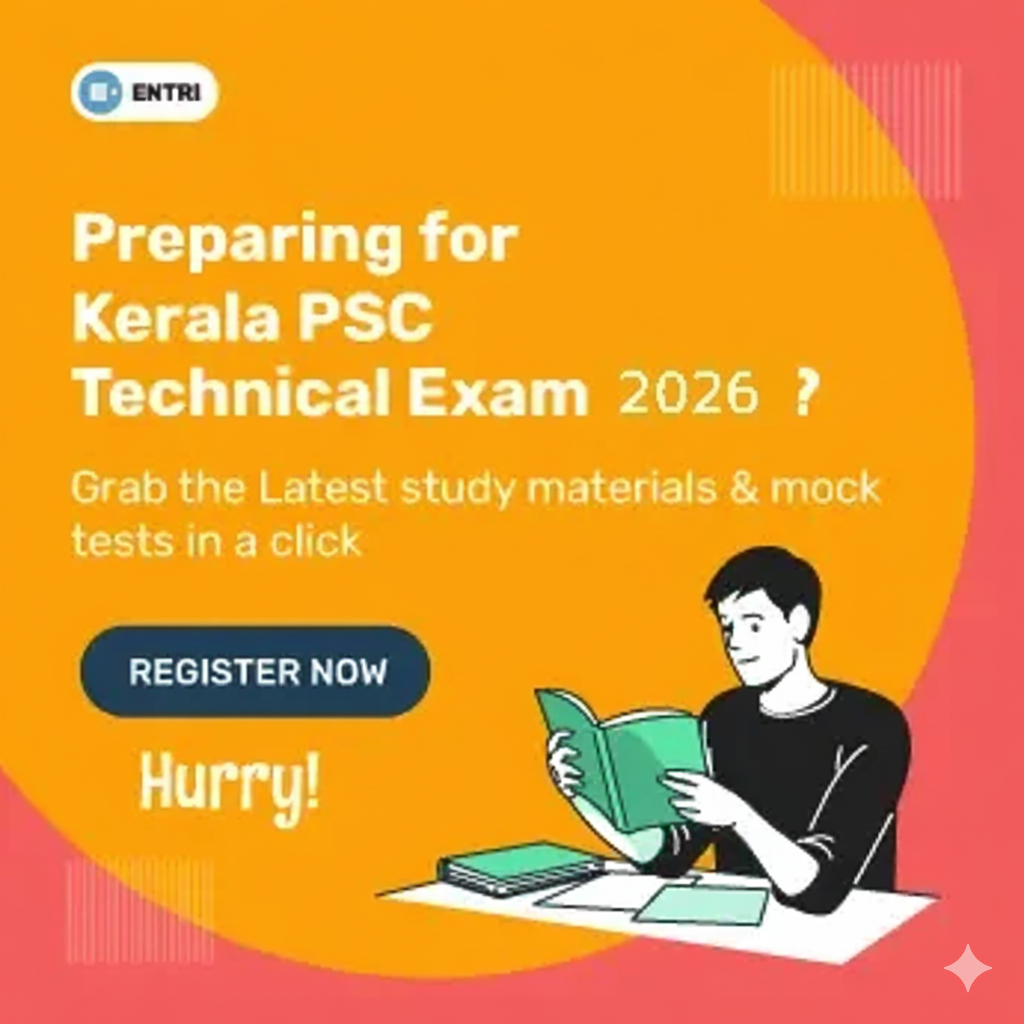Table of Contents
Kerala PSC has released the official notification (Category No. 095/2025) for Lecturer in Tool & Die Engineering in Government Polytechnic Colleges under Technical Education. The direct recruitment exam (Online/OMR, 100 marks) has now been scheduled, so candidates should start their preparation. We’ve attached the detailed syllabus here. Download now!
PREPARE FOR POLY EXAMS! JOIN NOW!
Kerala PSC Polytechnic Lecturer 2025 Recruitment Highlights
| Particulars | Details |
| Name of recruiting organization | Kerala Public Service Commission (PSC) |
| Name of department | Technical Education |
| Name of post | Lecturer in Tool & Die Engineering (Govt. Polytechnic Colleges) |
| Category Number | 95/2025 |
| Number of vacancies | As per Notification |
| Notification Release Date | June 16, 2025 |
| Exam Date | December 17, 2025 |
| Admit Card | December 03, 2025 |
| Mode of recruitment | Direct Recruitment |
| Mode of application | Online |
| Official website | keralapsc.gov.in |
Kerala PSC Poly Lecturer Tool & Die Engineering Lecturer Syllabus 2025 PDF
1: Between the period of 1858-1947, how many Viceroys ruled over India?
For your convenience, the complete Kerala PSC Lecturer in Tool & Die Engineering (Category No. 095/2025) syllabus has been compiled into a PDF. You can download the syllabus and start your preparation right away using the link below:
Prepare for Kerala PSC Technical Exams with Entri
സർക്കാർ ജോലി എന്ന സ്വപ്നം ഇനി സ്വപ്നം മാത്രമല്ല! Join Kerala's Top-rated PSC Coaching Programs
Join NowKerala PSC Poly Lecturer Tool & Die Engineering Previous Question Paper
| Question Paper Code | Download Link |
| 024/2015 | |
| 025/2015 | |
| 061/2016 | |
| 063/2016 | |
| 069/2016 | |
| 167/2016 | |
| 170/2016 | |
| 110/2023 |
Kerala PSC Poly Lecturer Tool & Die Engineering Exam Pattern 2025
The Kerala PSC Lecturer in Tool & Die Engineering exam (Category No. 095/2025) is scheduled for December 17, 2025, with the admit card available from December 03, 2025. The test will be 100 marks with 100 questions, and there will be a negative marking of 1/3 for each wrong answer.
| Module | Subject | Marks |
|---|---|---|
| I | Mathematics | 10 |
| II | Engineering Basics | 15 |
| III | Continuum Mechanics | 15 |
| IV | Mechanisms and Machine Tools | 10 |
| V | Manufacturing Planning and Production Processes | 15 |
| VI | Production Tooling | 20 |
| VII | Manufacturing Automation and Industrial Inspection | 15 |
| Total | 100 |
Kerala PSC Poly Lecturer Tool & Die Engineering Detailed Syllabus 2025
The Kerala PSC Lecturer in Tool & Die Engineering examination covers a wide range of topics from mathematics and engineering basics to advanced manufacturing, tooling, metrology, and automation.
Module I – Mathematics (10 Marks)
-
Linear Algebra:
-
Linear equations → Gauss elimination method
-
Eigenvalues & eigenvectors
-
-
Calculus:
-
Partial derivatives, chain rule, total derivative
-
Double integrals (Cartesian), change of coordinates
-
-
Differential Equations:
-
Homogeneous linear equations, Euler-Cauchy equation (second order)
-
PDEs by direct method
-
Wave equation & D’Alembert’s solution
-
Heat equation (1D)
-
-
Numerical Methods:
-
Newton–Raphson method
-
Interpolation, finite difference
-
Newton’s forward & backward formula
-
-
Geometric Modelling (CAD):
-
3D coordinate transformations (composite & inverse)
-
Wireframe, surface models
-
Cubic curves → Bézier, B-splines, NURBS
-
Module II – Engineering Basics (15 Marks)
-
Engineering Mechanics:
-
Static force analysis, free body diagrams
-
Planar & non-planar forces, friction (ladder, wedge, screw, belts)
-
-
Energy Conversion Systems:
-
Electrical drives → motor selection, speed–torque, power factor, speed control
-
IC engines → types & components (cylinder, piston, crankshaft, flywheel, camshaft)
-
Hydraulic machines → centrifugal & positive displacement pumps (gear, vane, screw, lobe)
-
Module III – Continuum Mechanics (15 Marks)
-
Fluid Mechanics:
-
Properties, Newton’s law of viscosity
-
Fluid statics → pressure, head, forces on surfaces
-
Kinematics → types of flow, Reynolds number
-
Dynamics → Navier–Stokes, Bernoulli’s equation & applications
-
-
Strength of Materials:
-
Stress, strain (true, logarithmic), yield stress
-
Shear force & bending moment diagrams (cantilever, simply supported beams)
-
Shaft design (direct, bending, torsional loads)
-
Welded joint design
-
Module IV – Mechanisms & Machine Tools (10 Marks)
-
Mechanisms:
-
Links, pairs, four-bar chain
-
Velocity & acceleration analysis (Coriolis component)
-
Gear trains → simple, compound, epicyclic; interference
-
Cams & followers → types, velocity analysis
-
Balancing → rotating masses, free & forced vibrations (mathematical model)
-
-
Machine Tools:
-
Lathe → indexing, half-nut, thread cutting
-
Milling → indexing head, universal indexing
-
Shaper → quick return, pawl & ratchet
-
Module V – Manufacturing Planning & Processes (15 Marks)
-
Production Management:
-
Process planning, tooling, cost estimation
-
Inventory management → EOQ, break-even analysis
-
-
Metal Cutting:
-
Lathe, shaper, slotter, planer → operations & work holding
-
Drilling → types, specifications, drill bit nomenclature
-
Grinding → cylindrical, surface, special grinders
-
Milling → conventional vs climb, machinability, hard turning
-
-
Metal Casting:
-
Melting, solidification, Fe–C system, microstructure
-
Sand casting, core prep, mechanization, centrifugal casting
-
-
Welding & Joining:
-
Arc (SMAW), MIG/MAG, TIG, FCAW, SAW, EBW, laser, FSW, ultrasonic
-
Metallurgy → HAZ, dilution, weldability
-
-
Metal Forming:
-
Plasticity, Tresca & von Mises criteria, hot & cold forming
-
Rolling, forging, extrusion, drawing → load calculations
-
Sheet processes (piercing, blanking, bending, deep drawing)
-
Heat treatment (annealing, normalizing, hardening)
-
Module VI – Production Tooling (20 Marks)
-
Cutting Tools:
-
Single-point → nomenclature, design, tool life, chip formation
-
Multi-point → milling, drills, broach design
-
Tool materials → HSS, carbides, inserts
-
-
Grinding Tools:
-
Abrasives, bonds, wheel selection/specifications, truing, dressing, balancing
-
-
Press Tools:
-
Types → progressive, compound, combination
-
Strip layout, % utilization
-
Punches, dies, strippers, ejectors, pilots, knockouts
-
-
Die & Fixture Design:
-
Sand mold, riser/gating
-
Plastic injection molding dies
-
Jigs & fixtures → 3-2-1 principle, locating devices
-
Module VII – Automation & Industrial Inspection (15 Marks)
-
Automation:
-
Types → fixed, programmable, flexible
-
CNC → programming (2–3 axis), canned cycles, ATC, pallets, DNC
-
Pneumatic & hydraulic circuits (multi-cylinder, time delay)
-
CAE → FEM, manufacturing simulation
-
-
Industrial Inspection:
-
Tolerances, fits, linear & angular measurement tools (sine bar, slip gauge, CMM)
-
Gauges → Go/No-Go, plug, snap, ring
-
Surface finish → CLA, RMS, measurement methods
-
Calibration of measuring instruments
-
-
Quality Control & Industry 4.0:
-
SQC, sampling, control charts
-
CIM, FMS, ERP, TQM, PLM, intelligent manufacturing
-
Prepare for Kerala PSC Technical Exams with Entri
സർക്കാർ ജോലി എന്ന സ്വപ്നം ഇനി സ്വപ്നം മാത്രമല്ല! Join Kerala's Top-rated PSC Coaching Programs
Join NowHow to Download KPSC Poly Lecturer Tool & Die Engineering Syllabus 2025
To download the official syllabus from the Kerala PSC website, follow these steps:
- Visit the Kerala PSC homepage.
- Click on the “Downloads” tab in the top menu.
- Select “Syllabus” from the dropdown list.
- Click on “Postwise Syllabus”.
- In the search or filter section, find “Tool & Die Engineering Lecturer” (Category No. 95/2025).
- Click the “Download” icon next to the post name to get the syllabus PDF.











